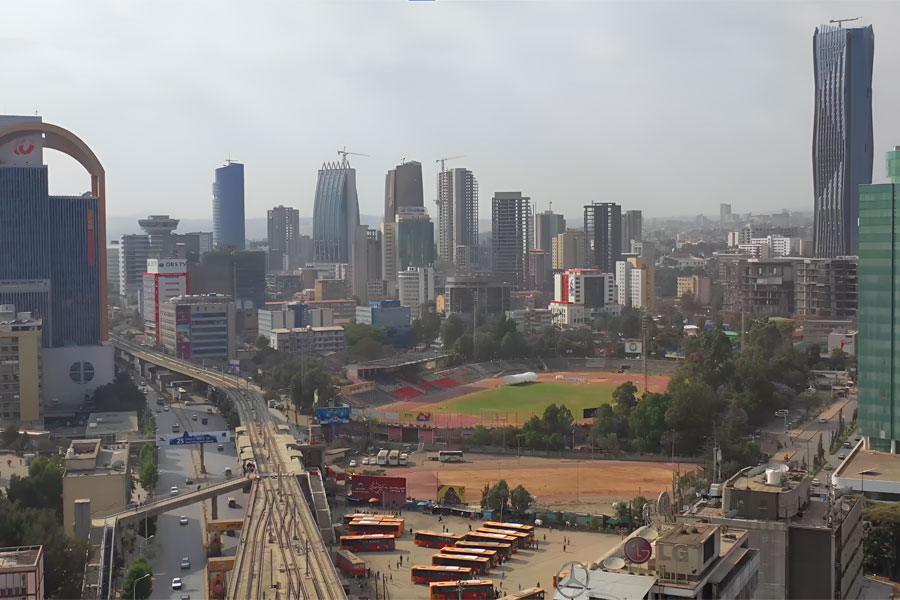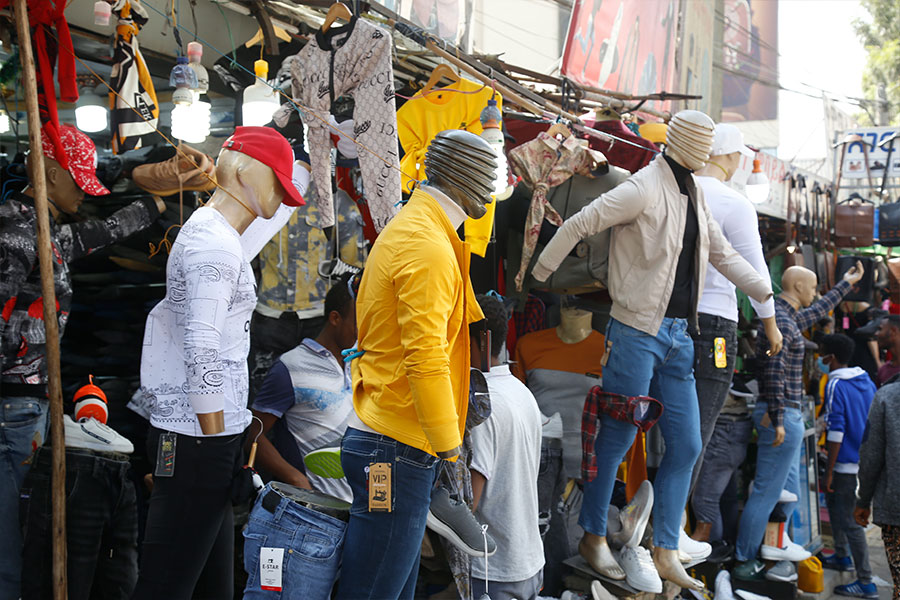
Agenda | Nov 27,2022
For 43-year-old Alemnesh Neri, travels to her hometown of Gumer in central Ethiopia have long been a cherished tradition. Twice annually for the past 22 years, she would make the trip from Addis Abeba, laden with goods and gifts for family and friends. This year, however, spiralling costs and mounting logistical problems have forced her to cut back her visits to only once.
Items that used to cost her 5,000 Br now have skyrocketed threefold. Inflation has dramatically eroded her purchasing power. Transportation expenses have tripled, soaring threefold from 500 Br, further straining her modest income. Travel itself has become more arduous. Hotels along the route are frequently overcrowded during peak travel times, leaving visitors like Alemnesh scrambling for accommodation.
Despite the allure of cheaper goods in smaller towns along the way, the constraints of rigid bus schedules, often limited to brief one-hour lunch breaks, make it difficult for passengers to make necessary purchases.
“From spices to clothing, these stops offer a break from rising city prices," she told Fortune. "But, the journey has turned into a race against time.”
The New Year festivity coincides with Mesqel, a vibrant carnival celebrated on 27 September, marked by the burning of a large bonfire known as "Demera." The holiday holds deep cultural and religious importance, especially in northern and central Ethiopia. It represents the end of the rainy season and prompts city dwellers to return to the countryside. The festivities are characterised by processions, hymns, and communal gatherings, mirroring the cultural richness of a traditional society.
However, the influx of travellers during the Mesqel season has placed immense pressure on local infrastructure, exacerbated by inflation and security concerns. These issues manifest the broader problems besieging the tourism sector, particularly in regions where Mesqel is heavily celebrated.
The road from Addis Abeba to the Gurage Zone, where Gumer is located, embodies these difficulties. Tour operators report that parts of the route, especially near Boti and Batu (Ziway), are plagued by security concerns. Fears of kidnapping and violence have discouraged local and foreign tourists from using this path.
“Safety has become a paramount concern,” says one operator. “The risks have led many to reconsider their travel plans.”
Infrastructure woes compound the problem. Many roads remain unpaved, creating inconvenience for travellers. Even in Welkite, a central and relatively more developed town along the route, adequate restroom facilities and other essential services are scarce. Unreliable electricity and water supplies make rest stops less comfortable, detracting from the general travel experience.
Yet, local efforts are underway to improve tourism facilities. In the Gurage Zone’s Arekert Wereda, the newly opened Muluworq Resort embodies the region’s ambitions. Built for 250 million Br, the resort boasts 47 rooms, all fully booked in the days leading up to Mesqel. The holiday season has drawn local and international tourists to the area, offering a glimmer of hope for the beleaguered sector.
One such tourist is Getu Yilma, who has travelled to the region from Johannesburg, South Africa, for the past four years. Spending up to 400,000 Br during his six-day visit, Getu acknowledged the progress and the persistent problems in the region's tourism development.
“The zone needs to have better roads,” said Getu. “Improvements to local infrastructure could enhance the tourism experience.”
Despite the arduous journey, the festive atmosphere and the gathering of families from across Ethiopia gave Getu a profound sense of fulfilment. His family celebrated Mesqel through the traditional ox-slaughtering event known as "Qircha", where portions are shared among friends and family.
“It's a connection to our heritage that keeps us coming back,” he said.
However, the tourism sector faces powerful headwinds. The flow of international tourists has been sluggish, particularly in the years following the COVID-19 pandemic. Experts attribute much of this decline to lingering security concerns and travel advisories issued by Western countries like the United Kingdom (UK) and Canada, which discourage non-essential travel to most parts of Ethiopia due to safety risks caused by civil unrest and militarised conflicts.
For Bogale Abey, owner of Dynasty Ethiopia Tour, these travel advisories have had a major impact on the sector.
“Tourists cannot obtain travel insurance with a travel advisory against the country of destination,” he said.
These travel advisories put several regions of the country in the red zone. The result has been a drastic reduction in the number of tourists visiting the country, particularly from foreign nations.
According to Ftsum Gezahegn, president of the Ethiopian Tour Operators Association, which represents over 300 tour operators, many of whom have been struggling due to the downturn in tourist numbers, improved marketing and promotion of Ethiopia, as well as streamlined visa processes, are needed to attract more international visitors.
“We've so much to offer, but the obstacles are formidable,” he told Fortune.
Henok Seyoum, a travel journalist, observed a near complete absence of foreign tourists in his tours of southern Ethiopia this September, citing ongoing regional security concerns and limited local movement. According to him, substantial incentives and investments for service providers in the sector are crucial, noting that tour operators pay VAT even though most of their expenses are not issued with receipts and thus cannot claim rebates.
“The financial burden on operators is unsustainable,” he warned.
Fitsum concurred, calling for increased state support. While laws permit tour operators to import vehicles tax-free, experts argue that more needs to be done, particularly in addressing security concerns that deter both foreign and local tourists.
“We need loans and tax incentives for operators to help the sector recover,” he said.
Domestic tourism, however, remains a key area of focus for the federal government authorities. In the Gurage Zone, officials anticipate more than 800,000 visitors this holiday season, including 3,000 foreign tourists, a projected 40pc increase from the previous year. According to Meseret Amelga, head of the Gurage Zone Culture & Tourism Bureau, the Zonal office expected to generate more than 100 million Br in transactions during the season.
Handmade goods, including pottery, traditional weaving, and products made of horn, are gaining traction, with local artisans set to generate an estimated 1.5 million Br in sales this holiday season. Despite these economic gains, Meseret acknowledged that the region still suffers from manifold constraints, particularly of infrastructure.
“Local roads remain underdeveloped, and improvements to basic services such as water and electricity are urgently needed to sustain long-term tourism growth,” she told Fortune.
With relatively few logistical, infrastructure, or security concerns, preparations for the festivity in Addis Abeba began months in advance. Debre Bisrat St Gabriel Church, in the Kotebe area, was selected as the organiser, deploying 5,500 youths from the Sunday School Union of the Ethiopian Orthodox Tewahedo Church. The Patriarch, Abune Mathias, presided over the proceedings on Friday, attended by President Sahle-Work Zewde, religious leaders, and guests. Invited priests from the Russian Orthodox Church performed religious hymns and chants, adding an international dimension to the festivities.
Preparations for Mesqel have been extensive. According to Ashenafi Mulugeta, president of the Addis Abeba Hotel & Tourism Professionals' Association, "more than 150 hotels in the city were ready to serve tourists arriving for the ceremonies."
Addis Abeba is known for lighting one of the most enormous "Demera" bonfires at Mesqel Square, an event that attracts visitors from near and far. This tradition was instrumental in UNESCO's 2013 recognition of the Mesqel festival as an Intangible Cultural Heritage of Humanity, demonstrating its cultural and historical importance.
Data from the Ministry of Tourism show that Ethiopia generated 4.3 billion dollars in tourism revenue from 1.1 million visitors last year. The Ministry's officials plan to draw 200,000 more tourists this year, including 395,218 during the peak season from September to December. They hope to generate 5.47 billion dollars.
However, industry experts question the accuracy of these figures. For Atlaw Alemu (PhD) of Addis Abeba University, the extremely low tourist visibility contradicts the Ministry's reported income, especially considering the widespread closure of tourist destinations.
“The Covid-19 pandemic's effects on the tourism sector require in-depth analysis to identify areas needing greater focus,” he told Fortune. “We can't say we have tourists when there are just a few.”
Industry experts agree that more needs to be done to revitalise the tourism sector.
The Ministry has taken steps to incentivise investment in the sector, offering tax-free imports of construction materials and land supply to developers.
As the tourism sector struggles to rebound from the effects of the pandemic and ongoing security issues, partnerships between the government and private sector are seen as crucial. With proper investment in infrastructure and increased security, Ethiopia could unlock its vast tourism potential. For travellers like Alemnesh and Getu, addressing these challenges could mean a more comfortable and enriching experience. And for Ethiopia, a thriving tourism industry could offer economic benefits.
Back in Gumer, as the flames of the "Demera" bonfire flickered against the night sky, there was a sense of hope mingled with apprehension. The Mesqel festival continues to draw people together, a symbol of unity in uncertain times.
For Alemnesh, despite the hardships, the journey remains worthwhile. “This is home,” she says softly. “No matter the challenges, it's where my heart is.”
PUBLISHED ON
Sep 28,2024 [ VOL
25 , NO
1274]

Fortune News | Sep 22,2024

Advertorials | Aug 05,2025

View From Arada | Feb 01,2019

Featured | Jul 06,2025

Radar | Nov 09,2024

Dec 22 , 2024 . By TIZITA SHEWAFERAW
Charged with transforming colossal state-owned enterprises into modern and competitiv...

Aug 18 , 2024 . By AKSAH ITALO
Although predictable Yonas Zerihun's job in the ride-hailing service is not immune to...

Jul 28 , 2024 . By TIZITA SHEWAFERAW
Unhabitual, perhaps too many, Samuel Gebreyohannes, 38, used to occasionally enjoy a couple of beers at breakfast. However, he recently swit...

Jul 13 , 2024 . By AKSAH ITALO
Investors who rely on tractors, trucks, and field vehicles for commuting, transporting commodities, and f...

Nov 1 , 2025
The National Bank of Ethiopia (NBE) issued a statement two weeks ago that appeared to...

Oct 25 , 2025
The regulatory machinery is on overdrive. In only two years, no fewer than 35 new pro...

Oct 18 , 2025
The political establishment, notably the ruling party and its top brass, has become p...

Oct 11 , 2025
Ladislas Farago, a roving Associated Press (AP) correspondent, arrived in Ethiopia in...